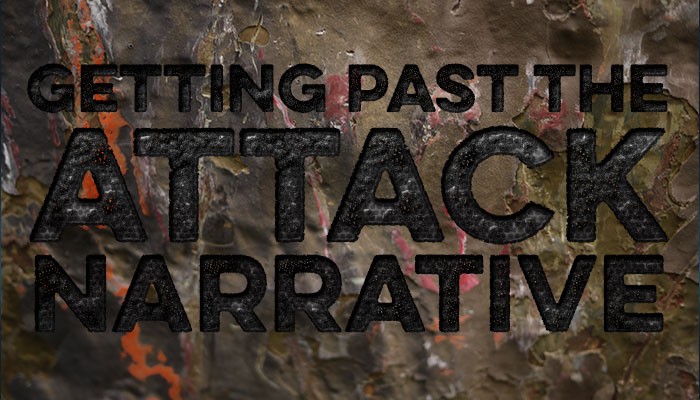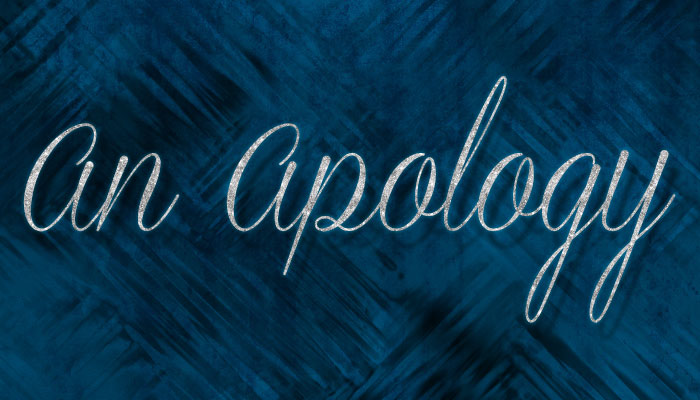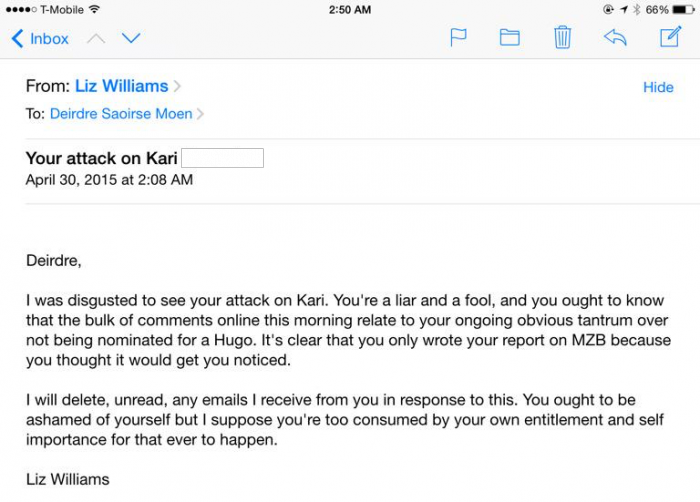Archive of posts with tag 'apologies'
May 2015: Getting Past the Attack Narrative

When does something become an “attack” online?
Serious question.
Let’s say that two people, Jane and Cait, are both authors.
Jane says something that involves Cait, only she uses a word incorrectly. Cait responds that, hey, that word used that way and applied to me in that context is offensive. And Cait’s right.
Why is Cait then accused of “attacking” Jane?
After all, these are words, the tools of both of their craft. Is not their increased understanding of them in both of their interests?
Wouldn’t one typically expect Jane to apologize for using a word incorrectly and hurting Cait’s feelings by doing so?
A More Complex Example
Let’s take a more complex variant of the above.
Sarah hears Jane say something that involves Cait, using a word incorrectly. Sarah understands it to mean the common meaning of the word. She writes about it, but doesn’t name Jane.
Ken reads Sarah’s comment, then says something about it where Cait hears. Cait responds that, hey, that word used that way and applied to me in that context is offensive. And Cait’s right.
Then Sarah says I wrote that, and the person who said it is Jane. While Sarah misunderstood part of what happened, what she did not misunderstand was the word.
And there’s a huge pile-on, in the middle of which Jane reveals that she hadn’t used the word the way Sarah, Cait, and Ken understood it to be used (i.e., the way it is commonly used), and that Jane was using the word in a non-standard way.
- Ken apologizes.
- Cait apologizes.
- Sarah apologizes.
- While Jane accepts all of their apologies, she does not herself apologize.
Yet, were it not for what Jane said, and others’ over-reading of the intended meaning because of Jane’s misuse of the word, none of this would have happened.
Substitute names as appropriate, and you have the skeletal structure of what happened 1-2 days ago.
Abusing the Word “Attack”
When you use the word “attack,” you absolve yourself and the people you see as your allies of apologizing or behaving well.
I’m considering removing anyone who uses the word in a non-physical sense from all my social media. I’ve been guilty of this in the past, too, and I know it’s a hard habit to break.
Instead, try to consider what actually happened in that moment without characterizing it, either to yourself or to others, as an attack.
Criticizing Content Is Not Criticizing the Speaker
Often I see “attack” used for criticizing the content of what someone said as opposed to criticizing the person.
I totally get how it can be hard to separate the two, especially when it happens to you. Been there, made that mistake. However, it’s one I’d expect writers to be, on average, less likely to make given the prevalence of Clarion-style critiquing.
Us vs. Them
I incorporate by reference this brilliant post from Jim C. Hines.
If I have information that will clarify a situation, regardless of whether or not I like the person it helps and also regardless of what it will cost me in so-called friends, I will bring it up. Principles before personalities. (Am I perfect at this? No, of course not. I also don’t seek things out, so I can and do miss such opportunities.)
Also, if I’m in contact with you, there is something I admire about you. I’ve been friendly with very contradictory sets of people, and I’m able to accept that everyone’s a mix of good and bad—and hold that complexity in my head.
If you’re one of my contacts, I don’t expect you to like everyone else. I don’t expect you to understand what I see in other people.
Connotation of Unprovoked
“Attack” used this way also carries the connotation of “unprovoked.”
If, instead, we look at the events above as a misunderstanding and clarification, rather than an “attack,” we can learn from it.
You know, build a community rather than destroy it.
Just a thought.
The Header Image Background
The header image background is a photo I took of the battering surface of an M60 Patton tank. It seemed an appropriate choice.
Apr 2015: My Comment Goes Viral, Escalates, and I Apologize

tl;dr: A comment I made 2-1/2 weeks ago got tweeted, escalated, and lots of feelings were hurt. As two people have made statements about my motiviations, this post is about context from my perspective as well as apologies for my part.
Backstory, Before Eastercon 2015
- If you’d asked me who Kari Sperring was, I’d have said a British fantasy writer. I believe we’ve commented in the same posts at times on LiveJournal. We’d never met face-to-face that I can recall.
- I’d never personally spoken with (or tweeted with or emailed, etc.) Benjanun Sriduangkaew. It’s possible that we’ve engaged in the same LiveJournal comment threads over the years, but I don’t specifically recall any.
- I was unaware that Ms. Sperring and Ms. Sriduangkaew had any history, partly because I’ve mostly been off LiveJournal since before the period when that happened.
Eastercon, Saturday, April 4, 2015
After the Hugo Awards nominations were announced (Eastercon was one of the announcing conventions), I got a lift back to my hotel, then wrote The Puppy-Free Hugo Award Voter’s Guide. By the time I woke up on the 5th, it had received about two thousand hits.
Eastercon, Sunday, April 5, 2015
I heard on Twitter that there was going to be a panel on the Sad Puppies and they were assembling people for that panel, so I asked in program ops if I could be on the panel.
For context: I first worked convention programming for ConJosé, the 2002 Worldcon, where I was staff for the late Kathryn Daugherty. I was her programming 2nd for the following year’s BayCon, then went on to be the programming head for BayCon for two years. Since then, I’ve worked as programming staff (of various kinds) at the local, regional (Westercon), and Worldcon level, most recently as co-head of programming for last year’s Westercon in Salt Lake City.
I say this so that you will know that I very much know what it’s like to be a) the person who makes the decisions about panels, and b) the person who has to deliver news to people, and c) the minion who is neither the bearer or decider of news.
I was fine with any answer as to whether or not I could be on the panel. I did not try to push my way onto the panel, nor is it sour grapes, and I am not sore about not getting onto the panel. I have no sense of entitlement about these things. I thought I had interesting things to say, but, hey, I also have a blog.
When I arrived in program ops Sunday afternoon, I was asked if I wanted to wait or come back. What you may not know if you’re new here: I’m mobility impaired (I need two knee replacements and have severe arthritis of the lower spine), and suffer from both debilitating fibromyalgia and myofascial pain. My pain is worst when I’ve either a) slept poorly, or b) am jetlagged—and I’d taken a ten-hour flight to get to the con. I was in miserable shape, so I decided to stay because walking anywhere would hurt. I worked for a while in the room, talked a bit with someone about the Ellora’s Cave situation (and found a new Loose Id author to read), and then Rick and Mike Willmoth showed up and we went to dinner. I was told by program ops staff to check back before the panel.
Which I did. As the panel time approached, I had actually left program ops, then I was asked to return to be told that no, the panel was going to focus on how the current Hugo situation affected the British professional scene. I thanked the programming person. Paraphrase of what I said: “Panels have a point of view, and it’s clear the one you’ve chosen isn’t one I’d be a fit for, and I’m fine with that.” He double-checked with me and I assured him that I was.
But it’s worth noting that I didn’t have any answer until about exactly when the panel was starting.
Then I went to the panel, which had already started, and Rick gave up his seat for me and stood with the SRO part of the crowd.
I did not livetweet during the panel (which I had the night before; the Hugo Award nominees were announced in the same room) because I was running low on power on all my devices.
The Fanfic Moment
And now we get to the moment that went viral.
Specifically, what went viral yesterday was reaction to this comment I made on April 13th:
Where things begin to bug me is the amount of toxicity currently being directed at Bee, such as the awkwardly uncomfortable part of the Sad Puppies panel at Eastercon, where it was suggested that someone write Vox Day/Requires Hate slash.
Here is the only account I have found tweeted during the panel:
Sperring: Vox Day fan of Requires Hate. Oh the irony (sensed hint of slight sarcasm) #SadPuppiesPanel
— James Worrad (@jimworrad) April 5, 2015
You’ll note they are very different, and one of the reasons I delayed writing this post until this morning after things blew up late last night was that Rick had already gone to sleep and I wanted to ask his memory of what was said before writing this post. Not because I disbelieve Ms. Sperring’s account (which I’ll get to in a minute), but because I know for a fact that what I mean to say and what I actually say aren’t always the same thing. Plus, my own memory is not infallible.
The two phrases that specifically stuck with me are: “Vox Day Requires Hate slash” and “Give it to me, Voxy!” [edited to add note: the latter phrase is not in the same context, see James Worrad’s comment below] and the subject matter was Vox Day being a fan of Requires Hate. I somehow missed that this was an already written fic. Ms. Sperring says the content was entirely non-sexual, and I have no reason to disbelieve her, but she did use the word “slash” and that does imply relationship and/or sexual content in fic (my interpretation at the time was that it was at least suggestive, if not actually sexual). I’m a fanfic writer, though, and I am used to more concise terms.
I can understand why Ms. Sriduankaew, who is a lesbian, would see sexualized fiction of her and Vox Day to be rape fic, and I have to admit that I hadn’t really thought that far ahead in part because I didn’t think the “slash” in question existed yet.
To be clear, I never assumed that Ms. Sperring was/would be the writer of said fic. I’m thankful that Ms. Sperring, Ms. Sriduankaew, and I agree that rape fic isn’t something we’d write, and something we agree is appalling.
Things Escalated Yesterday
The short version:
- Shaun Duke, who has already apologized for his part in this, escalated my comment, where Ms. Sriduankaew saw it. At that point, Ms. Sriduankaew had no idea either a) where the comment originated (me), or b) who the speaker I referred to was.
- I didn’t actually know for certain it was Ms. Sperring who made the comment until yesterday when I was contacted by the Dysprosium chair (!) about the backstory behind my comment. I said to Rick, “I don’t actually know that it was Kari Sperring who made the comment.”
Rick replied, “I do.”
It was only then that I knew. - It turns out Shaun contacted the Dysprosium chair, suggested that she contact me, referred her to my comment, but did not specify what action he thought should be taken.
- I also did not specify what action I thought should be taken, nor was I asked. I think the incident was, to be as charitable as possible, a tacky off-topic blip in what was a discussion about a hot topic.
- By the time I looked at Twitter after responding to the chair’s inquiry, I’d realized the issue had already spilled over there. This is the tweet where I reply to Ms. Sriduangkaew’s inquiry.
It doesn’t fit popular theories about Ms. Sriduangkaew abusing others, I know, but the actual fact is that neither I nor she knew until yesterday. Neither I nor Ms. Sriduangkaew started this escalation; Shaun did. Otherwise, it’d have been an obscure footnote on a post.
@shaunduke I don’t know what I can say further, to be honest. I’ve never met Deirdre so I don’t know anything about how she may think.
— Kari Sperring (@KariSperring) April 30, 2015
So, thank you, USians who do not know me, for your judgments. I hope you are never similarly judged by strangers.
— Kari Sperring (@KariSperring) April 30, 2015
It would be nice to be extended the same courtesy about my motivations.
My Apology to Kari Sperring
- I apologize for unintentionally misrepresenting that this was a yet-to-be-written fic.
- I apologize for failing to consider that “slash” did not mean the same thing to Ms. Sperring as it did to both myself and Benjanun Sriduangkaew (fka Requires Hate).
- I apologize for not reaching out to find out what Ms. Sperring meant before I commented.
My Apology to Benjanun Sriduankaew
This was a comment I made on my blog, and you should not have heard it from someone else first.
See Also
This post on Asymptotic Binary, as it covers the timeline differently.
Edited to add: I used Ms. Sperring and asymbina’s post pointed out something I had not known (having missed the panelist introductions): she’s Dr. Sperring. I mean no disrespect by referring to her as Ms. Sperring. My usage comes from my father, a Ph.D. in Particle Physics from Cal Tech, who took his usage from Richard Feynman after teaching Feynman’s course on Physics to freshmen when my dad was a graduate student. Mr. Feynman did not like people using Dr. as a title.
I Get Mail

Liz, you are an astonishingly loyal friend, and that can be a very good trait to have. I’m sad that you think so little of me that you sent this without asking me what happened, especially given your email to me on March 5th containing this line:

In fact, I actually didn’t expect any notice of any kind when I wrote the pieces on Marion Zimmer Bradley last year. I rather expected to be ousted from quite a few circles, frankly.
First, I forgive your outburst, and I’m sorry for my part of what clearly led to your stress.
You know what, though? I helped Marion Zimmer Bradley’s daughter, Moira Greyland, stop being afraid of her own shadow after being molested by her mother. I gave her a place to have a voice, to speak publicly for the first time, for both her and I to help people speak out on an important topic—and that is worth more than a trophy any time.
May 2014: An Apology to Cheerleaders
As someone who was a band geek, I have to say that I was one of those who looked down on cheerleaders—and vice-versa. I was envious of how pretty they were, envious of the attention they got, and I thought my own skills on musical instruments were More Important. You know, petty how teenagers are petty.
I was wrong, of course, and I’ve learned to really respect the very real skills that cheerleaders (and people doing physical things rather than cerebral skills) have.
All the impure thoughts I’ve had about cheerleaders or cheerleading over the years? I’m sorry. I was reacting in my teens based on my own hatred about society’s messages about cultural expectations about women, and not considering that maybe some women really enjoyed cheerleading. It should be fun and joyous.
And paid well.
The working conditions for NFL cheerleaders are horrific, especially when compared with the opportunities for men in the field. > But even as collective bargaining has caused players’ salaries to skyrocket, cheerleaders are still treated with the expendability of borrowed college students. Of the 26 teams that employ cheerleaders, only Seattle publicly advertises that it pays its squad an hourly minimum wage.
No one should have to endure such conditions.
What conditions?
“far weirder indignities (including elaborate rules about how to wash their vaginas..)”
The world is stranger—and far more horrible—than I give it credit for sometimes.
What I’d Have Expected Cheerleaders to Be Paid
I know a lot of people who watch games specifically for the halftime segments, who love the cheerleaders, and they’re paid how much?
If you’d asked me how much I expected them to be paid, I’d probably have guessed the median full-time salary for women, which translates to $36,380 a year (using the lowest woman median from last year). I’d have considered that a bare minimum, especially given the amount of money teams rake in, and how cheerleaders are used to boost a team’s image.
And before you tell me that they only work part of the year, they work just as long (and just as hard) as the star athletes.
We simply don’t value their skills as much, mostly because it’s a glamour job done by women.
And that is truly unfortunate.